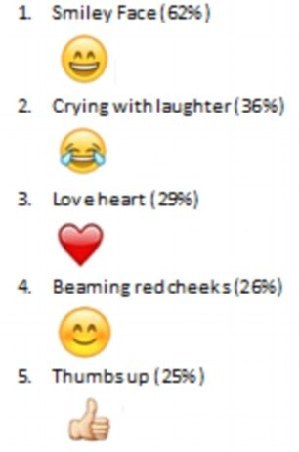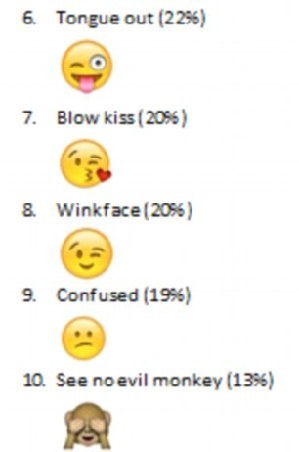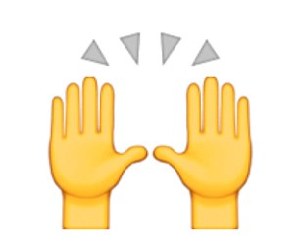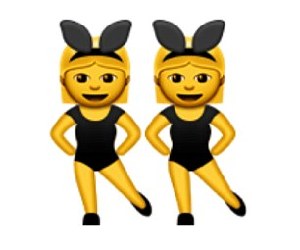当前位置: Language Tips> 双语新闻
What is YOUR emoji IQ? This test reveals how well you know what the symbols in 'the fastest growing language' mean


The most popular emoji, according to the study, is the 'smiley face' followed by the 'crying with laughter face'. The 'See no evil monkey' rounded off the top 10.
研究显示,最为流行的表情符号是“笑脸”,然后是“哭笑不得”,“非礼勿视的猴子”表情流行度也位列前十。
'Given the utility and added value provided by emoji, their usage is expected to increase exponentially across all age and cultural groups,' continued Professor Evans.
“鉴于表情符号极具实用性,富含附加效果,表情符号的使用有望在所有年龄层及文化群体之间成几何级数增加,”Evans教授继续说道。
'Unlike natural languages such as English, emoji is almost universally recognisable because it exploits the visual representation system.
“由于表情符号利用了视觉表现系统,所以与英语这样的自然语言不同,表情符号几乎是普遍公认的。”
'Emoji won't replace traditional languages but it will increasingly be used to enhance them.
“表情符号不会替代传统的语言,但是表情符号的广泛使用会增强传统语言效果。”
'I think it's conceivable that emoji will increasingly be used to complement digital versions of written works.
“我认为表情符号将越来越多地被用于文学作品数字版的补充。”
'For instance, the inclusion of emoji to help convey meaning in abridged versions of Shakespeare could help bring those great stories to life for a whole new generation.'
“例如,在莎士比亚著作删节版中加入表情符号来表达含义,可以使这些著作更加贴近生活,有利于新一代对名著的理解。”
Instagram recently similarly studied the use of the symbols on its app to try to establish the context of many popular, and more obscure, emoji.
近期,Instagram也研究了表情符号在其应用程序中的使用情况,试图创造一些更流行、更高明的表情符号的文本编写模式。
It discovered emoji often have a shared meaning regardless of where in the world you are, and in some cases, are replacing internet slang completely.
研究发现,不论你身在何处,表情符号通常都可以实现意义共享。在某些情况下,可以完全替代网络俚语。
According to Instagram, almost 40 per cent of text comments on the app now contain emoji.
Instagram研究表示,现在近40%的应用程序文本中包含表情符号。
Researchers discovered that emoji are replacing internet slang.
研究人员还发现,表情符号正在代替着网络俚语。


For example, 'omg' - slang for 'oh my god' - has been replaced with the 'face screaming with fear' emoji.
例如,“我的上帝“(OMG)已被“带着恐惧的尖叫表情”所替代。
While 'lol', and 'lmao' - laugh my ass off - is being replaced by the 'face with tears of joy' emoji.
而“大声笑”(lol)或“笑死我了”(lmao)已被“笑哭了”的表情所替代。
The love heart has replaced kisses on comments, and the 'thumbs' up emoji is a catch-all for good luck, good job, fingers crossed, impressed and proud.
评论中“红心”已替代了“吻”,“竖起大拇指”则表示好运、干得好、求好运、钦佩和自豪。


The research also revealed that the 'person raising both hands in celebration' emoji is more commonly used in place of words relating to waiting and stopping.
研究还表明,“欢庆时举起两只手”这一表情符号多用于表示等待或停止。
'Women with bunny ears' is typically used to represent sisters, and the 'dancing lady' is used for birthday-related posts.
“带有兔耳朵的女性”通常表示姐妹,“跳舞小姐”则用于与生日相关的帖子。
上一篇 : 人生时刻表:27结婚29买房
下一篇 : 没勇气分手?你可以雇人啦
关注和订阅


电话:8610-84883645
传真:8610-84883500
Email: languagetips@chinadaily.com.cn